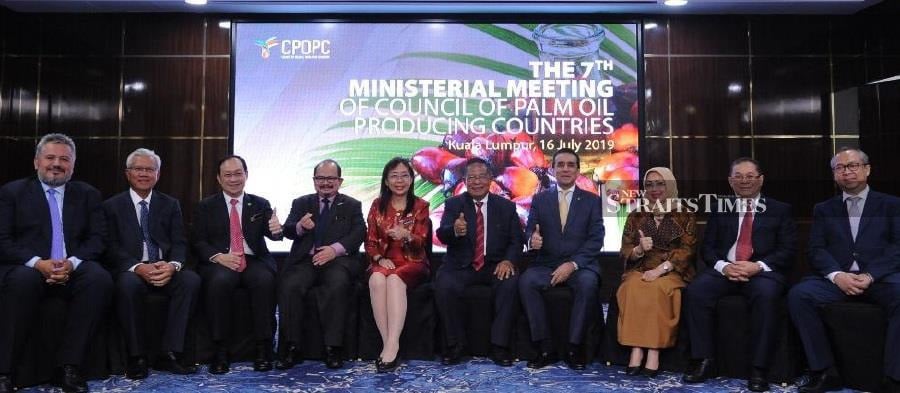
Council of Palm Oil Producing Countries (CPOPC) said Indonesia and Malaysia will jointly seek justice at the World Trade Organisation (WTO) as the EU presses on to ban palm oil.By Ooi Tee Ching – July 16, 2019 @ 8:02pm
KUALA LUMPUR: Council of Palm Oil Producing Countries (CPOPC) said Indonesia and Malaysia will jointly seek justice at the World Trade Organisation (WTO) as the EU presses on to ban palm oil.
On June 10, 2019, the EU Parliament passed the Delegated Act to restrict and ban palm oil biofuel altogether, by 2030.
The Delegated Act is discriminatory against the economies of developing nations in Southeast Asia, Africa and Latin America which produce palm oil.
Malaysia’s Primary Industries Minister Teresa Kok, Primary Industries Deputy Minister Datuk Seri Shamsul Iskandar Mohd Akin, Indonesia’s Coordinating Minister for Economic Affairs Darmin Nasution, Indonesia’s Coordinating Minister for Economic Affairs Musdhalifah Machmud and Ambassador of Colombia to Malaysia Mauricio Gonzalez Lopez participated in the CPOPC meeting here today.
In a statement, CPOPC said the governments of Indonesia and Malaysia are reviewing their relationship with the EU and its Member States.
Indonesia and Malaysia, via CPOPC, are committed to challenge the EU Delegated Act through the WTO Dispute Settlement Body and other possible avenues.
The European Parliament’s passing of the Delegated Act is a brazen disrespect to global trading norms and country sovereignty as it ignores Asean government-driven certification schemes, namely the Indonesian Sustainable Palm Oil (ISPO) and Malaysian Sustainable Palm Oil (MSPO).
CPOPC was established in 2015 as a common government-to-government platform to promote global palm oil trade and neutralise trade barriers.
Both Darmin and Kok had, time and again, highlighted the EU Delegated Act supplementing Directive 2018/2001 of its Renewable Energy Directive II is detrimental towards the socio-economic well-being of millions of oil palm planters in tropical Asia.
Indonesia and Malaysia collectively supply about 60 million tonnes or 85 per cent of the world’s palm oil.
In the statement, Darmin and Kok welcomed the ‘Masterplan for the Strategic Implementation of United Nation’s Sustainable Development Goals (SDGs) in the Palm Oil Sector by 2030, commissioned by CPOPC.
CPOPC’s detailed study showed oil palm cultivation meets the 17 SDGs based on surveys conducted across palm oil producing nations of Indonesia, Malaysia, Thailand, Colombia and Nigeria.
CPOPC also said it is seeking to establish a CPOPC-EU Joint Working Group on Palm Oil, as a new platform to further respond to the EU Delegated Act.
This Joint Working Group shall engage CPOPC member countries and other palm oil producing countries, such as African palm oil producers.
Source : New Straits Times

